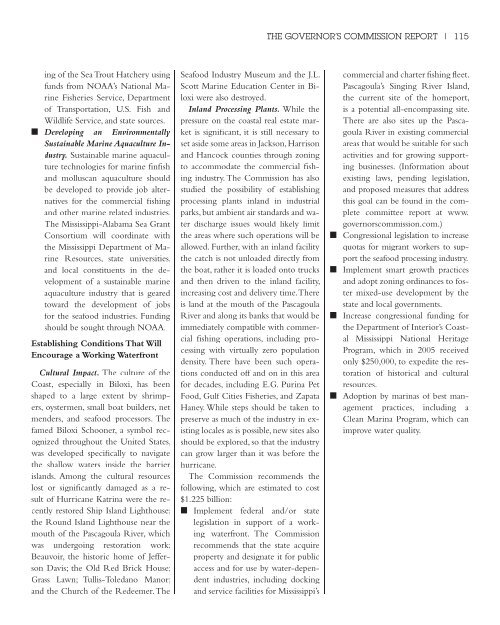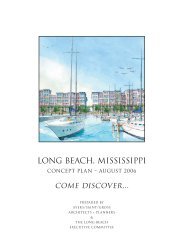Reports - Mississippi Renewal
Reports - Mississippi Renewal
Reports - Mississippi Renewal
- No tags were found...
Create successful ePaper yourself
Turn your PDF publications into a flip-book with our unique Google optimized e-Paper software.
THE GOVERNOR’S COMMISSION REPORT | 115ing of the Sea Trout Hatchery usingfunds from NOAA’s National MarineFisheries Service, Departmentof Transportation, U.S. Fish andWildlife Service, and state sources.■ Developing an EnvironmentallySustainable Marine Aquaculture Industry.Sustainable marine aquaculturetechnologies for marine finfishand molluscan aquaculture shouldbe developed to provide job alternativesfor the commercial fishingand other marine related industries.The <strong>Mississippi</strong>-Alabama Sea GrantConsortium will coordinate withthe <strong>Mississippi</strong> Department of MarineResources, state universities,and local constituents in the developmentof a sustainable marineaquaculture industry that is gearedtoward the development of jobsfor the seafood industries. Fundingshould be sought through NOAA.Establishing Conditions That WillEncourage a Working WaterfrontCultural Impact. The culture of theCoast, especially in Biloxi, has beenshaped to a large extent by shrimpers,oystermen, small boat builders, netmenders, and seafood processors. Thefamed Biloxi Schooner, a symbol recognizedthroughout the United States,was developed specifically to navigatethe shallow waters inside the barrierislands. Among the cultural resourceslost or significantly damaged as a resultof Hurricane Katrina were the recentlyrestored Ship Island Lighthouse;the Round Island Lighthouse near themouth of the Pascagoula River, whichwas undergoing restoration work;Beauvoir, the historic home of JeffersonDavis; the Old Red Brick House;Grass Lawn; Tullis-Toledano Manor;and the Church of the Redeemer. TheSeafood Industry Museum and the J.L.Scott Marine Education Center in Biloxiwere also destroyed.Inland Processing Plants. While thepressure on the coastal real estate marketis significant, it is still necessary toset aside some areas in Jackson, Harrisonand Hancock counties through zoningto accommodate the commercial fishingindustry. The Commission has alsostudied the possibility of establishingprocessing plants inland in industrialparks, but ambient air standards and waterdischarge issues would likely limitthe areas where such operations will beallowed. Further, with an inland facilitythe catch is not unloaded directly fromthe boat, rather it is loaded onto trucksand then driven to the inland facility,increasing cost and delivery time. Thereis land at the mouth of the PascagoulaRiver and along its banks that would beimmediately compatible with commercialfishing operations, including processingwith virtually zero populationdensity. There have been such operationsconducted off and on in this areafor decades, including E.G. Purina PetFood, Gulf Cities Fisheries, and ZapataHaney. While steps should be taken topreserve as much of the industry in existinglocales as is possible, new sites alsoshould be explored, so that the industrycan grow larger than it was before thehurricane.The Commission recommends thefollowing, which are estimated to cost$1.225 billion:■ Implement federal and/or statelegislation in support of a workingwaterfront. The Commissionrecommends that the state acquireproperty and designate it for publicaccess and for use by water-dependentindustries, including dockingand service facilities for <strong>Mississippi</strong>’scommercial and charter fishing fleet.Pascagoula’s Singing River Island,the current site of the homeport,is a potential all-encompassing site.There are also sites up the PascagoulaRiver in existing commercialareas that would be suitable for suchactivities and for growing supportingbusinesses. (Information aboutexisting laws, pending legislation,and proposed measures that addressthis goal can be found in the completecommittee report at www.governorscommission.com.)■ Congressional legislation to increasequotas for migrant workers to supportthe seafood processing industry.■ Implement smart growth practicesand adopt zoning ordinances to fostermixed-use development by thestate and local governments.■ Increase congressional funding forthe Department of Interior’s Coastal<strong>Mississippi</strong> National HeritageProgram, which in 2005 receivedonly $250,000, to expedite the restorationof historical and culturalresources.■ Adoption by marinas of best managementpractices, including aClean Marina Program, which canimprove water quality.




